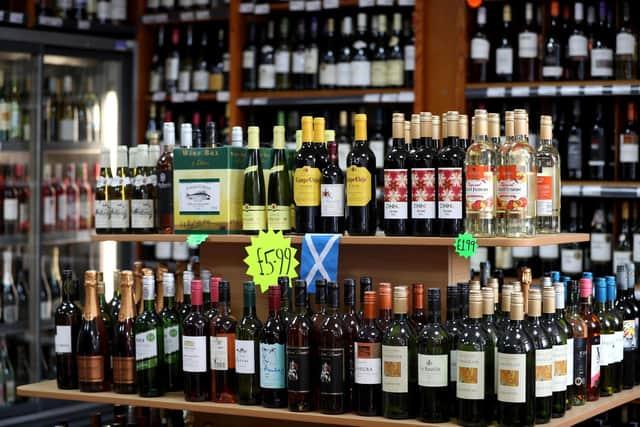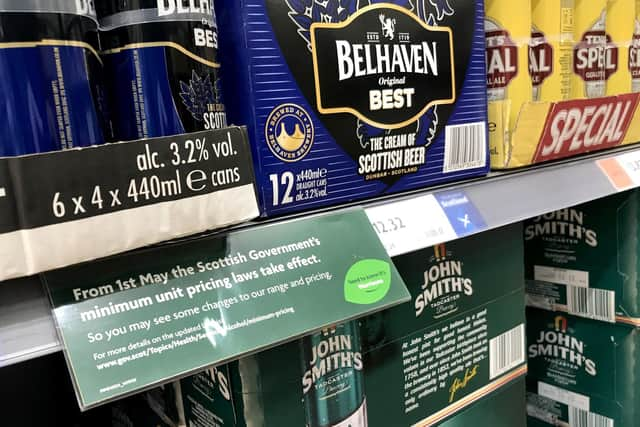Minimum unit pricing: Scotland should raise the cost of alcohol, top medics claim, as new report shows policy saved 150 lives last year
Health experts have told the Scottish Government to raise the level of minimum unit alcohol pricing in the wake of a Public Health Scotland report, which claims the policy saved 150 people from a drink-related death last year.
The new document from Public Health Scotland (PHS) collates several reports which have been published over the past few years looking into the various effects of minimum unit pricing (MUP)
Advertisement
Hide AdAdvertisement
Hide AdAccording to PHS, the meta-analysis shows MUP “has reduced deaths directly caused by alcohol consumption by an estimated 13.4 per cent and hospital admissions by 4.1 per cent, with the largest reductions seen in men and those living in the 40 per cent most deprived areas”.


The report’s authors say this equates to 150 fewer deaths and 400 fewer admissions in 2022/23, using England – which has not implemented a MUP policy – as a control.
However, the report also noted evidence of negative consequences for those on low incomes who had well-established dependencies on alcohol.
The PHS report said there was “limited evidence” the scheme had reduced consumption among this group – and had even led to some prioritising spending their funds on alcohol rather than food.
The publication of the analysis has already been met with calls to further increase the level of MUP in Scotland, as the UK’s high level of inflation may already have wiped out the effectiveness of the policy.


Professor Andrew Elder, president of the Royal College of Physicians of Edinburgh, said alcohol-related hospital stays in Scotland “continue to place strain on our acute health services” and deaths from alcohol “remain unacceptably high”.
“The evidence shows that MUP can be a key tool to help turn this situation around,” he said.
“The college considers that MUP can have an even greater and more positive effect on reducing Scotland’s alcohol harms if Parliament moves now to make MUP permanent and to uprate it to at least 65p. We call on the Scottish Government to take decisive action to take this forward without delay and we urge opposition parties to support this, recognising the benefits that have been identified by PHS.”
Advertisement
Hide AdAdvertisement
Hide AdDuring the SNP leadership election in March, Humza Yousaf told The Scotsman he would consider raising the 50p base rate of Scotland’s MUP for alcohol, to reflect “emerging evidence, inflation, people’s incomes and alcohol affordability”, and would “continue to keep the level under review” as First Minister.


The Scottish Government’s drugs and alcohol policy minister Elena Whitham claimed MUP had also contributed to reducing health inequalities, but did not make a statement on MUP’s future, other than saying the policy would be “carefully considered”.
“The study found the largest reductions in deaths and hospital admissions wholly attributable to alcohol consumption were seen in men and those living in the 40 per cent most deprived areas,” she said.
“We know that additional support is needed for some groups, including those dealing with alcohol dependence and issues such as homelessness.
“That’s why, alongside MUP, last year £106.8 million was made available to Alcohol and Drugs Partnerships to support local and national initiatives. We will now carefully consider this research as part of ongoing work on reviewing MUP.”


The policy, and the studies cited by PHS, are not without their detractors, however.
Scottish Conservatives shadow health secretary, Dr Sandesh Gulhane, told ministers to “carefully reflect” on the evaluation report.
“They have been wedded to the idea that minimum unit pricing is the solution to problem drinking in Scotland, but evidence from numerous studies challenges that naïve belief,” he said. “At best, MUP is a blunt instrument to tackle a complex problem.
Advertisement
Hide AdAdvertisement
Hide Ad“Alcohol deaths are at their highest level since 2008 in Scotland on the SNP’s watch. As the report highlights, minimum unit pricing alone will not fix the issues facing those struggling with addiction.
“It is clear that this flagship policy has made the lives of some of the most vulnerable even worse by making them more reliant on alcohol or turning to a life of crime.”
The right wing, free market think-tank, the Institute of Economic Affairs (IEA), which has admitted to receiving funding from the alcohol and retail industries in the past, said the report was a “whitewash” that “ignores most of the evidence from the Government’s own evaluation”.
“Research commissioned by PHS shows that minimum pricing had no impact on crime, no impact on A&E [accident-and-emergency] attendances and no impact on the heaviest drinkers,” said Christopher Snowdon, head of lifestyle economics at IEA.
“Minimum pricing was supposed to make people drinking at harmful levels consume less alcohol. This did not happen. In fact, the heaviest drinking men have been consuming more.”
The evaluation report claims while the impact on alcoholic drink producers and retailers varied depending on the mix of products made or sold, there was “no clear evidence of substantial negative impacts on the alcoholic drinks industry in Scotland as a whole”.
Meanwhile, Scottish Labour’s Carol Mochan called the report “encouraging”, but said it “highlights that more work must be done to tackle alcohol-related harm”.
"There is no room for complacency when it comes to tackling alcohol misuse, nor will a one-size-fits-all approach work,” she said. “We must protect local services to support people struggling with dependency.
Advertisement
Hide AdAdvertisement
Hide Ad"Only by investing properly in support, and by taking further steps to address issues related to the advertising and accessibility of alcohol, will we see greater reductions in the number of Scots suffering due to reliance on alcohol."
As previously reported, MUP led to a 3 per cent reduction in alcohol consumption at a population level, as measured by retail sales. However, for those people with alcohol dependence, PHS found “there was limited evidence of any reduction in consumption and there is some evidence of consequences for those with established alcohol dependence on low incomes, that led them to prioritise spending on alcohol over food”.
At a press briefing on Monday, The Scotsman asked how MUP could save lives, but not affect the drinking habits of dependent alcoholics.
A spokesperson for PHS explained the evaluation report analysed both quantitative and qualitative studies. Some of the drinking habits of dependent drinkers were analysed using individual interviews, which the spokesperson said “can be flawed” due to relying on the ability of dependent drinkers to recall their own understanding of how their consumption might have changed.
Despite this, the spokesperson said there was plenty of quantitative evidence to show consumption had dropped in the highest alcohol purchasing households.
“We have a lot of evidence data that shows that we have had a reduction in consumption at a population level, and that has been driven by reductions in those at the highest level of purchasing households,” they said.
“That comes from alcohol retail sales data, shopping panel data, and so providing us with evidence of what people are actually buying, and that is much less subjective data”.
Comments
Want to join the conversation? Please or to comment on this article.